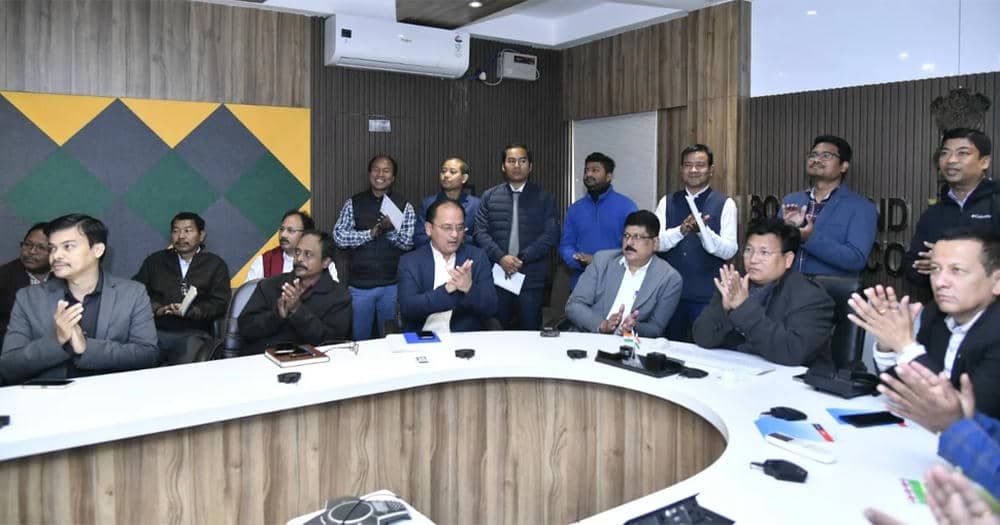Bodoland becomes first Sixth Schedule Council to digitise all land records, launch e-office system

In a landmark achievement, the Bodoland Territorial Region (BTR) has become the first Sixth Schedule Autonomous Council in Northeast India to fully digitise its land records and launch a comprehensive e-Office system. More than 15 lakh land documents, including text records and maps, have been successfully digitised, marking a major step towards transparency, efficiency, and digital governance in one of Assam’s most strategically significant tribal regions.
India has been pushing ahead with its Digital India mission, but Sixth Schedule tribal councils in the Northeast have long faced hurdles in digitisation. Complex customary landholding patterns, poor infrastructure, and limited digital literacy have slowed progress. There are 10 such councils across the region—three in Assam, three in Meghalaya, three in Mizoram, and one in Tripura. They are empowered under the Constitution to manage land, forests, and local governance. Until now, none had been able to complete a digital transition in land management.
The BTR administration’s success has earned special recognition from the Government of India, which has advised other Sixth Schedule councils to study and replicate the model. Officials have described the achievement as a benchmark in digital governance for tribal regions.
The introduction of the e-Office system in Bodoland replaces the decades-old practice of manual file handling with a fully digital platform. It allows electronic file movement, real-time tracking of decisions, online approvals, and paperless functioning. At the same time, the digitisation of land records means every land parcel in BTR is now securely mapped and stored in digital form. Citizens can access their records online, apply for mutations, verify ownership, and receive digitally signed documents without depending on intermediaries or repeated visits to government offices.
According to Dhiraj Saud, Secretary of the Bodoland Territorial Council, the process began in early 2023 with extensive ground surveys across Kokrajhar, Chirang, Baksa, Tamulpur, and Udalguri districts. Old records, some dating back decades, were digitised and cross-verified with revenue maps. Geographic Information System technology was used to ensure accuracy in land boundaries. Citizens can now check their land status through kiosks, mobile applications, and web portals.
Officials say this initiative will reduce land disputes, which have been a major source of social tension in the region. “This is a revolution for the region,” said one Land Revenue Department official. “By digitising records, we are ensuring transparency and minimising chances of corruption, forgery, and conflict.” A farmer from Baksa district, who recently accessed his digital land certificate, said the change was dramatic. “Earlier, we had to wait for months to get land documents. Now it is available in minutes. This has given us confidence that the government is truly working for the people,” he said.
The reform has been carried out under Mission Basumoti, which provides a range of land-related services. Under Mission Basumoti 1.0, more than 2.34 lakh applications were received, and over 2.11 lakh were disposed of. Mission Basumoti 2.0, launched recently by Assam Governor Laxman Prasad Acharya, has already registered 23,647 applications. Among them were nearly 9,000 small tea garden owners who, for the first time, secured land settlements. This has enabled them to claim benefits from the Tea Board of India. Officials admit the disposal of applications under Basumoti 2.0 has been slower, but they describe it as a landmark in empowering small tea growers.
BTR’s Chief Executive Member, Pramod Boro, has been credited with driving the reforms. Political observers note that the initiative brings Bodoland’s governance on par with progressive states and aligns it with the national vision of Digital India and the motto of “Minimum Government, Maximum Governance.” The move is expected to boost the ruling United People’s Party Liberal ahead of the 2025 Bodoland Territorial Council elections, as it demonstrates a visible commitment to reform and good governance.
Despite the success, challenges remain. Internet penetration in remote areas of BTR continues to be limited, and many rural citizens lack digital literacy. To address this, the administration has launched training sessions in villages to teach residents how to use the system. Digital kiosks are being set up at block and panchayat levels to provide support. Officials have also put in place safeguards to protect sensitive land data from misuse or cyberattacks.
“Digitisation is only the first step,” said Secretary Saud. “The real challenge lies in making these services accessible to the last mile and ensuring people trust and adopt the system.”
The initiative has been welcomed by the Ministry of Electronics and IT, which praised the council’s proactive efforts and expressed readiness to support further digital scaling in the region. Meanwhile, other Sixth Schedule councils in Karbi Anglong, Tripura, and Meghalaya are already studying the BTR model as a case study for replicating digital governance in tribal areas.
Officials in Bodoland stress that the e-Office system and land record digitisation are not just administrative upgrades but instruments of justice, equality, and empowerment. For the people of BTR, who have long faced bureaucratic delays and disputes over land, the shift to digital governance offers not just convenience but also renewed faith in the transparency of local administration.
With its achievement, Bodoland has demonstrated that even in regions where digital transitions are most difficult, determined leadership and structured planning can overcome barriers. Its success now stands as an example for other tribal councils across the Northeast and a milestone in India’s journey toward inclusive digital governance.



Leave a Reply